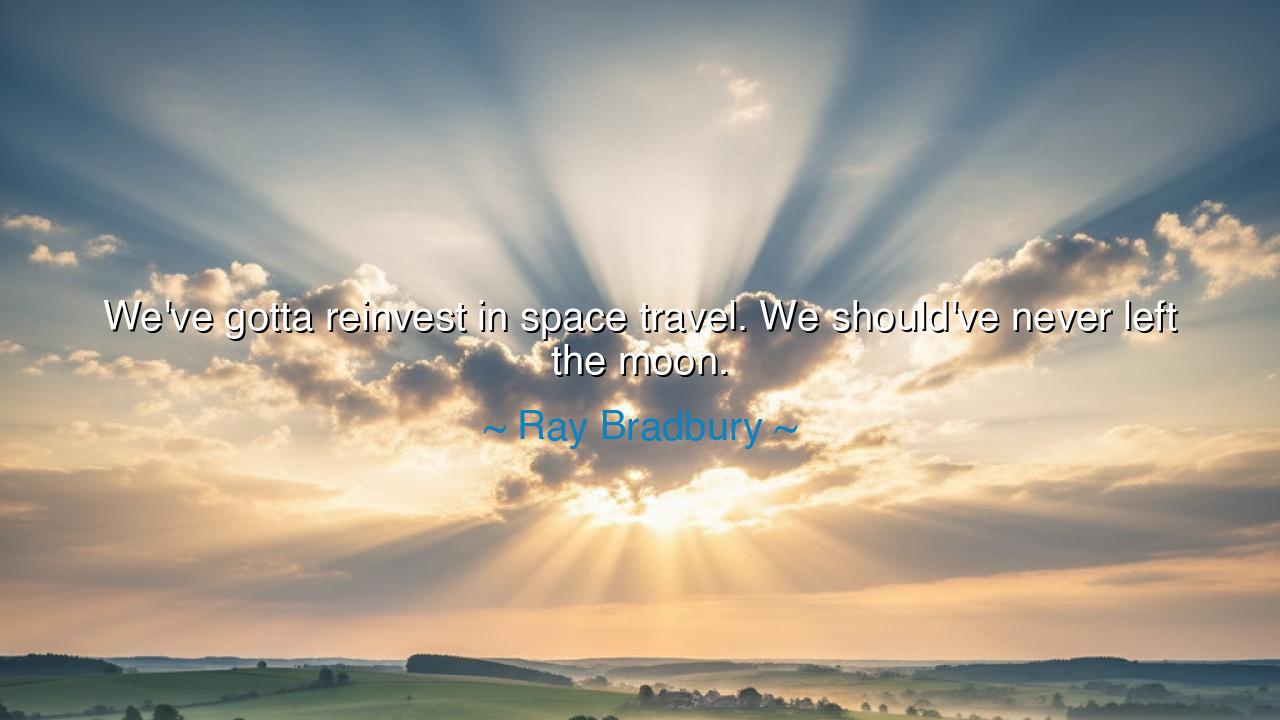
We've gotta reinvest in space travel. We should've never left






The words of Ray Bradbury, prophet of imagination and herald of the future, strike like a clarion call: “We’ve gotta reinvest in space travel. We should’ve never left the moon.” Here, the master storyteller speaks not only of rockets and missions, but of the hunger of the human spirit to expand beyond the cradle of Earth. His lament is not that of an engineer, but of a visionary who saw in the retreat from the moon a retreat from wonder, courage, and destiny itself.
For in 1969, when the astronauts of Apollo first set foot on the lunar surface, humanity accomplished more than a feat of engineering. We proved to ourselves that we could cross the abyss, that we could turn dreams written in poetry and prophecy into footprints pressed into alien soil. The moon became not a distant light in the sky but a neighbor touched by human hands. Yet after a handful of landings, we withdrew, content to let memory replace momentum. Bradbury, with the fire of a seer, declares this withdrawal a great mistake—for we abandoned not only the moon, but also the spirit of exploration itself.
The meaning of the quote rests in this truth: that progress is not maintained by a single leap, but by continuous striving. To touch the moon once and then depart is like a child taking its first steps only to sit down forever. Exploration must be nurtured, fed, reinvested in, lest it wither into nostalgia. Bradbury reminds us that humanity’s destiny is outward, into the stars, and to turn away from this path is to betray the promise we once glimpsed.
History gives us many mirrors of this truth. Consider the voyages of the great Polynesian navigators, who crossed vast oceans with nothing but the stars as guides. If they had dared one journey and then abandoned the sea, their culture would never have spread across thousands of islands. Instead, each voyage was followed by another, each risk sustained by the knowledge that to stop moving was to stop becoming. The Apollo missions, like those ancient canoes, opened the way—but we failed to continue the journey. Bradbury cries out that we must return to that spirit, lest we stagnate.
Moreover, his words reveal not only ambition but necessity. The moon is not merely a rock in the sky, but a stepping stone, a foundation for deeper voyages—to Mars, to the outer planets, and beyond. To abandon it was to halt at the threshold of a great house, never crossing into the rooms that lie beyond. To reclaim it, to reinvest in space travel, is to once more lift our eyes from the narrow horizons of Earth and to remind ourselves that we are not prisoners of this planet, but heirs of the cosmos.
The lesson for us is both heroic and urgent: do not abandon your frontiers. Whether they are the frontiers of science, art, or personal growth, never grow complacent with a single achievement. One victory is not the end but the beginning. Reinvest, return, build upon what was begun, and refuse to let fear or weariness turn triumph into stagnation. Just as humanity must reclaim the moon, so must each soul reclaim its unfinished dreams, daring to go further than before.
Thus, let this wisdom be passed down: the spirit of exploration is sacred, and it dies when neglected. Bradbury’s call is not only for rockets but for courage. We should have never left the moon, because in leaving, we left behind a part of ourselves. Let us return—not only in spacecraft, but in spirit—to that frontier where human beings once stood and gazed upon the Earth from afar. For there we remember what we are: travelers, seekers, builders of bridges across the infinite. And until we answer this call, our story remains unfinished.






AAdministratorAdministrator
Welcome, honored guests. Please leave a comment, we will respond soon